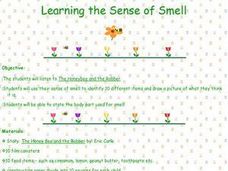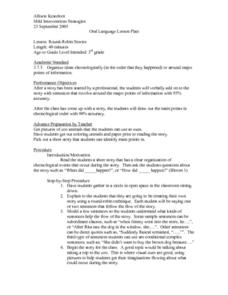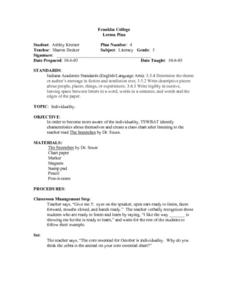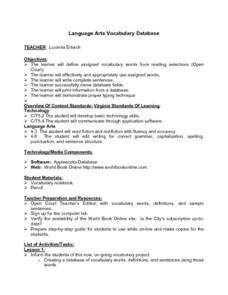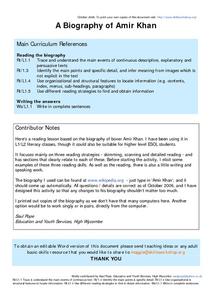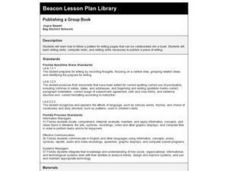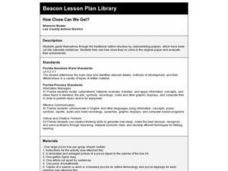Curated OER
What We Need
First graders identify basic needs of plants. For this plant growth lesson, 1st graders observe types of plants and review the parts of a plant as well as the development of a seed. Students review related vocabulary and read The Carrot...
Curated OER
Learning the Sense of Smell
Students learn about the sense of smell and the nose. In this senses lesson, students read The Honey Bee and the Robber, discuss how a bee uses its sense of small and get an introduction on what they sense of smell is. Students wear...
Curated OER
Cell Organelles
Students explore biology by researching living cells. For this living organism lesson, students participate in a role-playing activity in which all the students in class form one plant cell by portraying specific parts of a cell....
Curated OER
Word Choice in Writing
Sixth graders explore language arts by writing dialogue. In this vocabulary choice lesson, 6th graders identify synonyms and the importance of using a thesaurus while writing dialogue in their own original work. Students revise and edit...
Curated OER
Understanding Irony
Students discuss irony. In this language arts lesson, students identify irony and give examples of irony from their lives, a book, and current events. Students classify types of irony.
Curated OER
Pronoun Agreement Worksheet (Combined)
In this pronoun agreement worksheet, students select by underlining or circling the correct pronoun to complete 55 sentences. They identify and apply the difference between subject and object pronouns. Students also identify that "It"...
Curated OER
Understanding Adjectives
Students practice identifying and using adjectives in sentences. In this adjectives lesson, students review types of adjectives and find examples of them in the example sentences. Students also rewrite sentences and add adjectives to...
Curated OER
Interactive Pronoun Quiz #2
In this grammar worksheet, students identify and choose the appropriate type of pronoun the underlined word is in twenty sentences.
Curated OER
Shopping American Style
Students identify different sizes, clothing types and materials. They determine the correct size of clothing they would wear in the United States. Students brainstorm questions and answers related to clothing and clothes shopping. ...
Curated OER
RoundRobin
Third graders, following an original start to a new story, verbally add on to the story with sentences that revolve around the major points of information. After the students come up with a story, they draw out the main points in the...
Curated OER
Letters from the Road
Students examine and differentiate between rural, urban, and suburban communities. They describe their local areas, view and discuss the images on the West Virginia Quarter, and write a friendly letter describing a camping trip.
Curated OER
Acrostic Poems: What's In a Name?
Young scholars find words that begin with the letters in their own names, using a variety of sources including word banks and online dictionaries. They create an acrostic poem. Pupils revise poems as needed, for meaning and...
Curated OER
Language Arts: What Makes an Individual
Third graders listen to the teacher read "The Sneetches" prior to creating charts about their individual characteristics. After numerous examples of individuality, they compile them on chart paper. As an extension, 3rd graders write...
Curated OER
The Alphabet of Coins
Pupils use letter/sound relationships of initial consonants to complete sentences that follow a given repeating pattern. These sentences be based on coin terms found on the U.S. Mint H.I.P. Pocket Change™ Web site.
Curated OER
What's So Good About Popcorn?
First graders use a thinking map to organize a paragraph. They write and edit their paragraph about popcorn and type the final copy on the computer.
Curated OER
Language Arts Vocabulary Database
Pupils read a selection and identify the vocabulary words for the current week. Individually, they use the words to write in complete sentences and put the words into a database. They also practice their typing skills and must keep the...
Curated OER
Photo-Based Reading Projects
Students practice using a digital camera and identify the various parts. As a class, they review recent vocabulary and signs used in their community. In groups, they take pictures of various items and write complete sentences describing...
Curated OER
A Biography of Amir Khan
In this literature instructional activity, students read a biography about Amir Khan, a middleweight boxer who won an Olympic bronze in Athens. They identify whether each statement is true or false. Then, students look at his career and...
Curated OER
Poetry in Weather
Students observe and identify the various types of clouds. They compare clouds to clouds on a chart, and in small groups compose and present a group poem about clouds and weather.
Curated OER
Who's Doing What?
Students investigate different types of media and the uses found in society. They match the form of media and fill out the worksheet that is written in the foreign language. The lesson includes a student work sample. The scoring is also...
Curated OER
Learning About Weather
Pupils decide what type of weather they would like to write about such as tornadoes, hurricanes, snow, hail, floods, or another type of weather.
Then, they look up the information and jot down notes about that particular subject. After...
Curated OER
I Oppose!--Counter-argument/Classifying
Students create an effective classification and counter argument. In this counter-argument lesson, students decide upon a label for at least three types of people and then describe their groups. Students describe three types of people...
Curated OER
Publishing a Group Book
Students examine various alphabet books. They write several sentences for their assigned letter of the alphabet, type them onto a word processing program, and create an illustration for a class alphabet book.
Curated OER
How Close Can We Get?
Fourth graders guide themselves through the traditional outline structure by reassembling papers, which have been cut into separate sentences. They see how close they've come to the original paper and evaluate their achievement.



